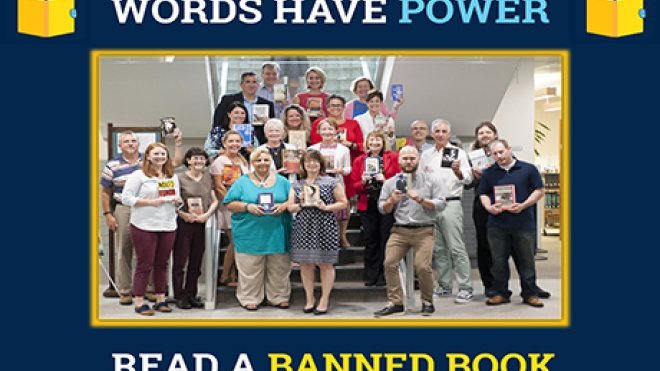Banned Books Week at RWU
This week, learn about the history of banned books and what you can do to celebrate.

BRISTOL, R.I. –You might remember this classic, bittersweet tale: A little girl named Fern raises a pig, Wilbur. Once full grown, Wilbur is sold to Fern’s uncle’s farm. Lonely in his barn, Wilbur befriends a spider named Charlotte. When Wilbur discovers he will soon be slaughtered, Charlotte has a plan. She weaves phrases into her web. “Some Pig,” she writes, “Humble, Radiant.” The community attributes the magical messages to Wilbur having a special gift and the pig’s life is spared, but Charlotte passes away soon after. Despite his grief, Wilbur finds comfort in his new friendship with Charlotte’s offspring.
A sad, yet touching children's book or an offensive piece of literature that must be banned?
At times, the books we know and love can spark great controversy.
Sept. 23 to Sept. 29 is Banned Books Week. To celebrate, University Archivist, Heidi Benedict, and Electronic Resources Associate, Jackie Katz, have created a fascinating exhibit in the University Library. You can learn why Charlotte’s Web, among other favorites, was once declared inappropriate for public consumption.
Benedict and Katz say books can be banned for any number of reasons. “Nudity,” they say, “especially in children’s books.” An example being Where’s Waldo, with a minuscule cartoon image of a topless sunbather on one of its pages.
“Religious disapproval” is another common reason, say Benedict and Katz. “All those books that have witches relate to that.” Harry Potter is a prominent feature in the display case.
“Language is a big one,” they say. They cite Captain Underpants as an example, some parents being unhappy with the use of insults like, “poopy-pants.”
Other, more serious language-based controversies include racial slurs in books like To Kill a Mockingbird, which elicit an important question––what do we do with books that include antiquated language we now understand is problematic?
In order to ban a book in the U.S., one first has to complete a form and submit it to the American Library Association (ALA). The ALA considers the request, but approval is difficult these days.
Katz, who worked in an elementary school, says "there was a whole process. Parents filled out a form and it first went to me, and then it went to the principal, and then it went to the school committee."
Usually, though, the result was not a ban, but an agreement to prevent certain children from checking out certain books. Katz and Benedict believe that individual families should be allowed to place restrictions on the content their children consume. They don't, however, think books should be removed from shelves.
“Some books have a significant place in history, and you’re ignoring that if you ban the book,” Benedict says. “It’s a record of the past and you don’t want to hide that.”
Katz and Benedict stress that banned books are important for sparking conversation, even if they prompt disagreement and dialogue. “As a library, we need to have books available for everyone,” Benedict says. They invite you to visit the exhibit and see what you think. Should these books be banned? Why or why not? Do you have a favorite banned book?
How to Celebrate Banned Books Week:
Visit: The exhibit is located on the first floor of the University Library, behind the front desk. It will be available for the entire month of September.
Vote: A cart of banned books will be available at the exhibit for your perusal, along with a ballot, where you can vote for your favorite.
Hear from Local Writers: The ACLU of RI and William Hall Library present “Banned Books Out Loud: Writers Read Banned Books,”on Wed. Sept. 26, featuring such brilliant voices as Rick Moody and Adam Braver, among others.
Read: Looking to add some banned books to your reading list or learn more about literary censorship? Check out this extensive LibGuide, prepared by Outreach & Communications Coordinator Hannah Goodall. Happy reading!